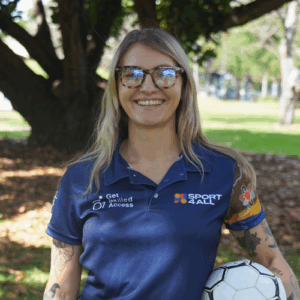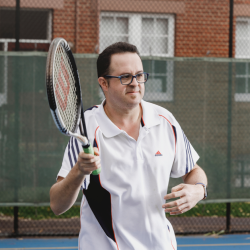My Journey as a Neurodiverse Inclusion Coach

Alex Woodward
Inclusion Coach - City of Darwin
Discovering my neurodiversity and my purpose
For most of my life, I knew I experienced the world differently – I just didn’t have the words for it. It wasn’t until a few years ago that I was formally diagnosed with ADHD. That moment wasn’t just a label; it was a lens. Suddenly, things started to make sense – the ways I responded to pressure, the times I felt overwhelmed by noise or expectation, and the deep sense of being “other” in spaces that were supposed to feel safe.
As a young person, school was exhausting. Sport was supposed to be my escape, but even there, I often felt I didn’t quite belong. While I loved movement, teamwork, and being part of something bigger, I didn’t always feel included. There were little things – being misunderstood by coaches, feeling left out of social banter, or struggling to stay focused when instructions were rapid-fire. They added up.
Back then, I didn’t have the vocabulary to explain what I needed, and others didn’t always have the awareness to ask. That’s what drives me now as an Inclusion Coach; the chance to create spaces where people don’t have to constantly explain themselves, where they can just be.
Reimagining what inclusion really means
When people hear “inclusion,” they often think about ramps, lifts, or accessible bathrooms. And while those are essential, inclusion goes so much deeper. It’s about the culture we create – whether people feel welcome, valued, and safe to participate as they are.
For someone who is neurodiverse, inclusion might look like having quiet spaces at a sporting event, allowing breaks during long training sessions, or simply being asked how we process information best. Often, it costs nothing – just a shift in mindset, a little more patience, and a willingness to listen.
One of the biggest misconceptions is that accessibility is hard. The reality? Small, thoughtful changes can make a world of difference. And the ripple effect is real – when you create inclusive environments, everyone benefits.
Finding a home in Sport4All
As an Inclusion Coach working with Sport4All, I’ve found a place that allows me to turn my lived experience into impact. I get to visit clubs, schools, and community organisations and start conversations about inclusion that go beyond checklists. It’s not about telling people what they’re doing wrong – it’s about exploring what’s possible together.
I remember one of my first sessions where I could see the lightbulb moment happen for a coach. We were talking about sensory overload, and he said, “I’d never thought about how loud our changerooms can be for someone with ADHD or autism.” That moment stuck with me. It reminded me that people do want to be inclusive – they just don’t always know how. My job is to help bridge that gap.
What I want clubs and communities to know
You don’t have to be perfect to start. And inclusion isn’t about fixing people – it’s about adjusting environments so that more people can thrive.
Ask questions. Be curious. If someone discloses their diagnosis or access needs, listen – really listen. Don’t assume, don’t dismiss, and most importantly, don’t be afraid to change the way things have always been done. Often, the “way it’s always been” is exactly what’s keeping people out.
Inclusion also isn’t one person’s job. It’s a team effort – from committee members to coaches to volunteers and players. And while lived experience is powerful, we shouldn’t always expect people with disability or neurodivergence to educate others for free. Pay them, value them, include them from the beginning – not as an afterthought.
Looking ahead
For me, this work is personal. I want the next generation of neurodiverse kids to walk into a club and feel like they belong – not in spite of who they are, but because of it. I want them to see coaches who understand, environments that adapt, and communities that celebrate difference.
And I want organisations to see the strength that comes from diversity – not as a compliance requirement, but as a culture shift that benefits everyone.
We’ve still got a long way to go. But every conversation, every small change, every moment of genuine connection brings us closer to a sporting landscape where everyone, truly, has a place.
Get the Sport4All news sent to your inbox. Subscribe to our monthly newsletter!
"*" indicates required fields

